Unit 3 Teenage problems Period 2课件+音频(共36张PPT)牛津译林版九年级上册
文档属性
| 名称 | Unit 3 Teenage problems Period 2课件+音频(共36张PPT)牛津译林版九年级上册 | 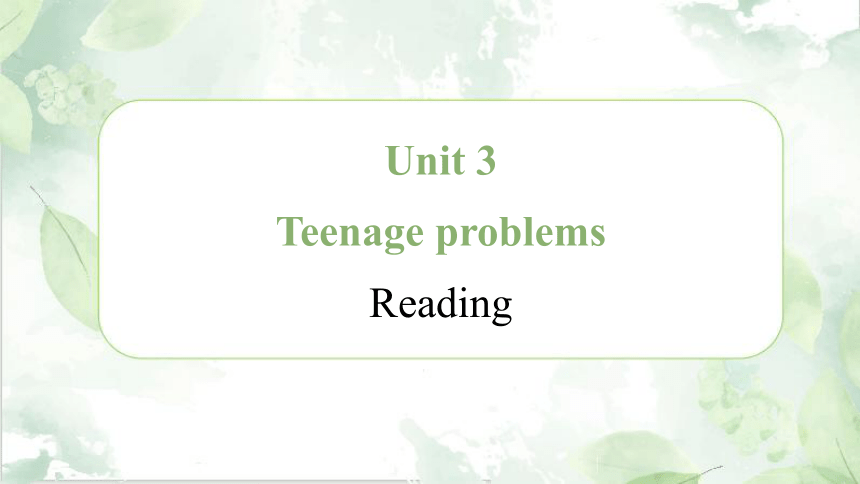 | |
| 格式 | pptx | ||
| 文件大小 | 5.8MB | ||
| 资源类型 | 教案 | ||
| 版本资源 | 牛津译林版 | ||
| 科目 | 英语 | ||
| 更新时间 | 2024-10-20 11:43:11 | ||
图片预览

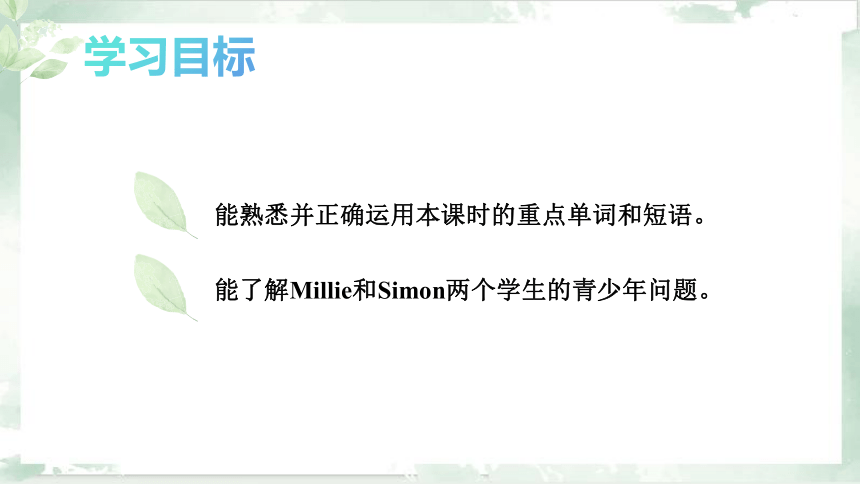

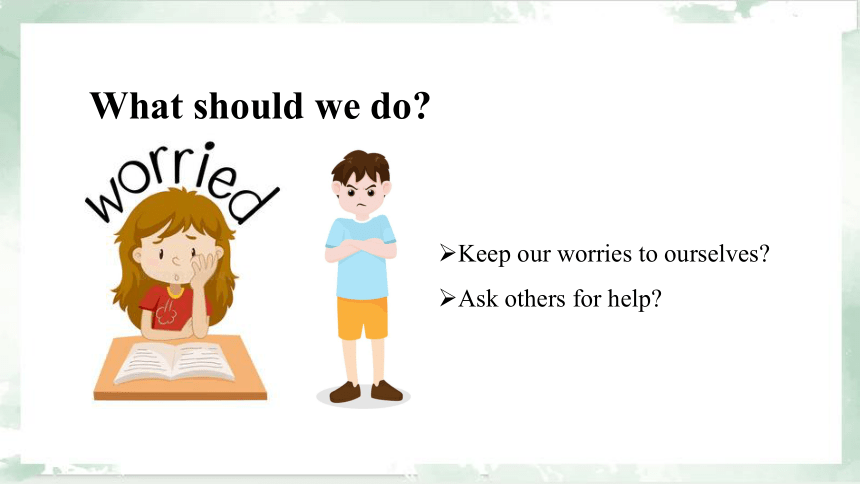
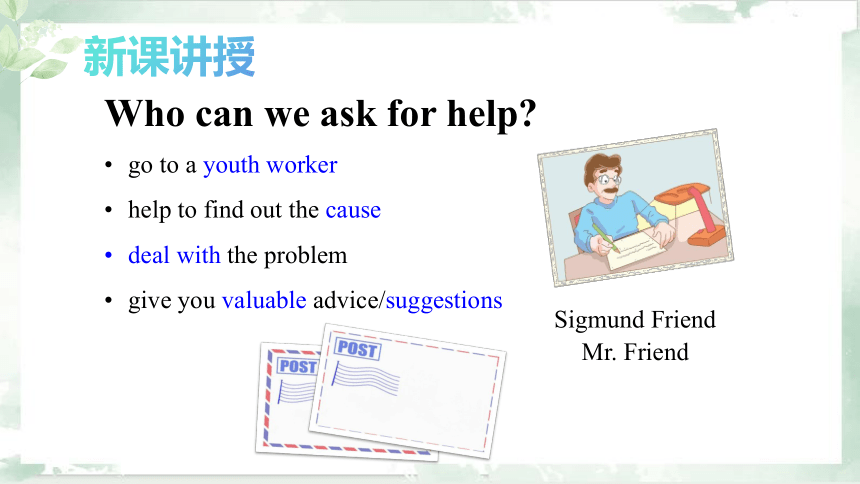
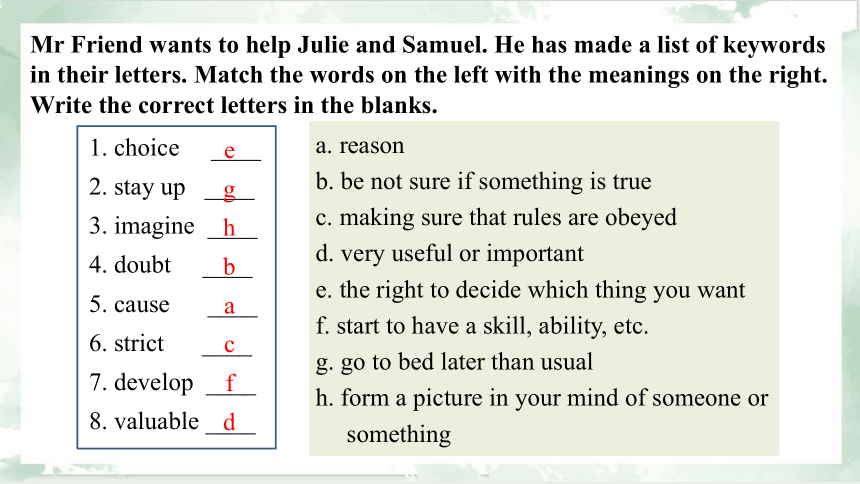

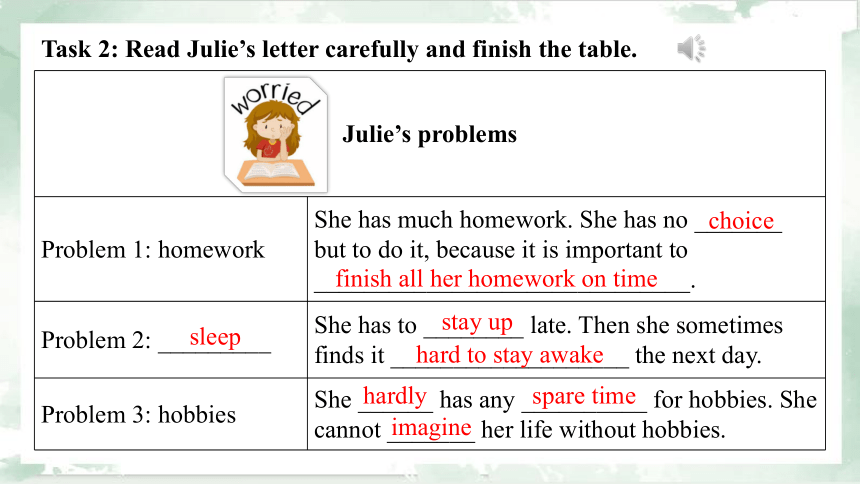

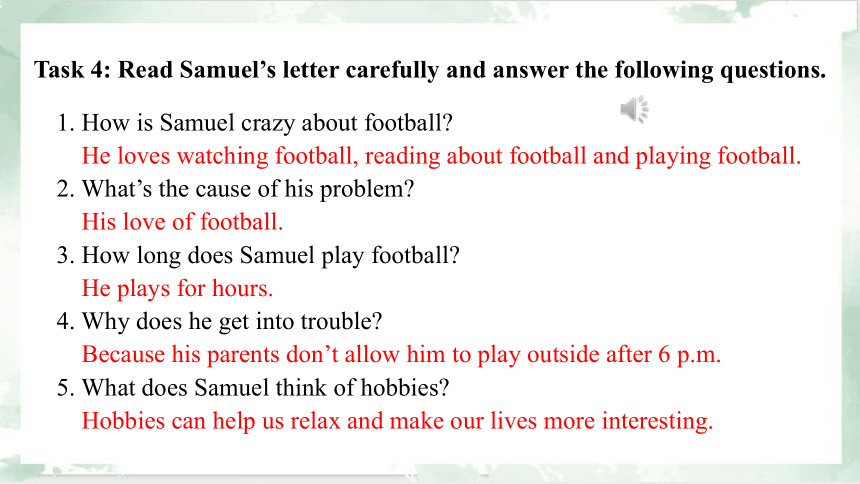
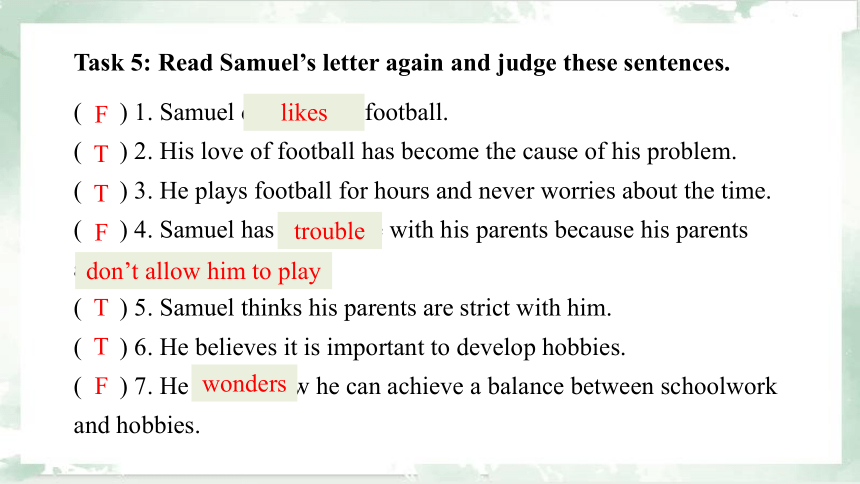

文档简介
(共36张PPT)
Reading
Unit 3
Teenage problems
能熟悉并正确运用本课时的重点单词和短语。
能了解Millie和Simon两个学生的青少年问题。
学习目标
Millie
Simon
Kitty
Daniel
Amy
Sandy
What problem does he/she have What should he/she do
Pre-reading
What should we do
Keep our worries to ourselves
Ask others for help
Who can we ask for help
go to a youth worker
help to find out the cause
deal with the problem
give you valuable advice/suggestions
Sigmund Friend
Mr. Friend
新课讲授
Mr Friend wants to help Julie and Samuel. He has made a list of keywords in their letters. Match the words on the left with the meanings on the right. Write the correct letters in the blanks.
1. choice ____
2. stay up ____
3. imagine ____
4. doubt ____
5. cause ____
6. strict ____
7. develop ____
8. valuable ____
a. reason
b. be not sure if something is true
c. making sure that rules are obeyed
d. very useful or important
e. the right to decide which thing you want
f. start to have a skill, ability, etc.
g. go to bed later than usual
h. form a picture in your mind of someone or something
e
g
h
b
a
c
f
d
Task 1: Skim the text quickly and answer the following question.
What are Julie’s and Samuel’s problems
lots of homework
staying up late
not enough time for hobbies
not enough time for hobbies
strict parents
While-reading
Task 2: Read Julie’s letter carefully and finish the table.
Julie’s problems
Problem 1: homework She has much homework. She has no _______ but to do it, because it is important to ______________________________.
Problem 2: _________ She has to ________ late. Then she sometimes finds it ___________________ the next day.
Problem 3: hobbies She ______ has any __________ for hobbies. She cannot _______ her life without hobbies.
choice
finish all her homework on time
sleep
stay up
hard to stay awake
hardly
spare time
imagine
Task 3: Read Julie’s letter again and judge these sentences.
( ) 1. Julie has much homework every day.
( ) 2. Julie finds it easy to stay awake the next day.
( ) 3. Julie has enough spare time for her hobbies.
( ) 4. Julie finds it is worth spending so much time on homework.
( ) 5. Julie dreams of a long holiday in order to have more time for her hobbies.
T
F
F
F
T
hard
doesn’t have
doubts if
Task 4: Read Samuel’s letter carefully and answer the following questions.
1. How is Samuel crazy about football
He loves watching football, reading about football and playing football.
2. What’s the cause of his problem
His love of football.
3. How long does Samuel play football
He plays for hours.
4. Why does he get into trouble
Because his parents don’t allow him to play outside after 6 p.m.
5. What does Samuel think of hobbies
Hobbies can help us relax and make our lives more interesting.
Task 5: Read Samuel’s letter again and judge these sentences.
( ) 1. Samuel doesn’t like football.
( ) 2. His love of football has become the cause of his problem.
( ) 3. He plays football for hours and never worries about the time.
( ) 4. Samuel has no trouble with his parents because his parents allow him to play.
( ) 5. Samuel thinks his parents are strict with him.
( ) 6. He believes it is important to develop hobbies.
( ) 7. He knows how he can achieve a balance between schoolwork and hobbies.
F
T
T
F
T
T
F
likes
trouble
don’t allow him to play
wonders
Mr Friend wants to keep a record of each student. Look at the cards and help him complete them.
√
√
Julie
√
√
Samuel
×
×
×
×
×
×
×
×
Post-reading
Julie
Problems She _____________________ for her hobbies.
Causes She often ________ late to ________ her exercises.
But she accepts it because she thinks it’s important to _______ her homework on time.
Feelings She doesn’t know how to __________ it.
She feels quite ___________________ about it.
hardly has spare time
stays up
finish
deal with
bad/stressed/worried
do/finish
Finish the table according to Julie’s and Samuel’s letters.
Samuel
Problems He can’t ________ a balance between his ________________________.
Causes He is ______ about football.
He often stays out late to play football with _______ of friends.
His parents are _______ with him and don’t ______ him to play it after 6 p.m.
Feelings He feels _________ from time to time.
achieve
schoolwork and his hobbies
crazy
lots
strict
allow
angry
What are the similarities between Julie and Samuel
can't keep/achieve a balance
hobbies
schoolwork
How to help Julie and Samuel deal with their teenage problems
Mr Friend is replying to Julie’s and Samuel’s letters. Help him complete the sentences with the words in the box.
stay up
homework
spare
hobbies
volleyball
worth
advice
playing
important
strict
stay out
valuable
After helping Julie and Samuel solve their problems, can you think of some ways to solve our own problems
Describe the problem.
Analyze the causes.
Give advice.
schoolwork
hobbies
Further thinking
1. I have a problem, and I do not know how I should deal with it.
deal是不及物动词,do是及物动词,因此疑问词连用时,deal with与how连用,do with与what连用
how to deal with it = what to do with it 怎样处理它
Practice:
1. 你打算怎么样处理这些旧衣服?
_____ are you going to _____ _____ the old clothes
= ______ are you going to _____ _____ the old clothes
How deal with
What do with
Language points
2. Then I sometimes find it hard to stay awake the next day.
此处的 it为形式宾语,形容词hard是宾语补足语,动词不定式to stay awake才是真正的宾语。
Practice:
1. 我发现学好数学很难。
I find _____ ________ ____ ______ maths well.
2. 他认为懂一门外语是必要的。
He thinks _____ __________ ____ know a foreign language.
it difficult to study
it necessary to
3. However, I hardly have any spare time for my hobbies.
(1) hardly adv.几乎不,相当于almost not,表示否定意义。常位于be动词、助动词、情态动词之后,实义动词之前。
e.g. I hardly ate anything last night.
在反意疑问句中,若主句中有hardly,其反意疑问句要用肯定形式,类似用法的还有never, seldom等。
e.g. He can hardly finish his homework, can he
(2) hard adj.硬的;苦难的,艰苦的
hard adv.努力地;猛烈地
★hardly不是hard的副词形式
Practice:
1. 他几乎什么也看不见,是不是?
He can _______ see _________, ______ he
2. She always does very well in the English exams. But she can ______ understand English radio programs.
A. always B. hardly C. already D. easily
hardly anything can
4. I cannot imagine my life without hobbies.
imagine v.想象,设想
imagination n.想象力,想象 imaginative adj.富有想象力的
imagine doing sth. 设想做某事
e.g. I didn’t imagine becoming a doctor one day.
5. I often doubt whether it is worth spending so much time on homework.
(1) doubt v.怀疑
a. 在肯定句中,doubt后一般接whether或者if引导的宾语从句; doubt后也可以接that引导的宾语从句,但表示疑虑较大或者“不相信”。
e.g. I doubt whether I’ll be successful.
b. 在疑问句和否定句中,doubt后接that引导的宾语从句。
e.g. I don’t doubt that it is true.
(2) doubt n.疑问;不确定
There is no doubt that … 毫无疑问……
e.g. There is no doubt that he will succeed one day.
Practice:
1. 我不敢肯定她是否会遵守诺言。
I _______ ___________ she will _____ _____ _________.
2. 我从未怀疑过他会来。
I _______ ______ ______ he would come.
doubt whether/if keep her promise
never doubt that
6. I often doubt whether it is worth spending so much time on homework.
(1) worth adj.值得
be worth后面接名词、代词或动名词,前面可以用well, really等词修饰,但一般不用very修饰。
be worth doing sth. 值得做某事
e.g. The Summer Palace is worth a visit.
This book is well worth reading.
(2) worth adj.值……钱
e.g. The camera is worth seven hundred dollars.
Practice:
1. 我认为这本书很值得看。
I think the book is ______ _______ ________.
2. 大家都认为他是一个值得交的朋友。
Everyone thinks that he _____ _______ _________ _______ ______.
well worth reading
is worth making friends with
7. I dream of a long holiday so that I could have more time for my hobbies.
(1) so that意为“以便,为了”,引导目的状语从句,相当于in order that,从句中常有can/could/would/should等情态动词。
e.g. We exercise every day so that we can keep healthy.
(2) so…that…意为“如此……以至于……”,so后面接形容词或者副词,that后面接结果状语从句。
e.g. The little boy is so young that he can’t carry the box.
Practice:
1. 为了保持健康,他坚持每天锻炼。
He ______ __________ every day ____ _____ he can _____ ________.
2. 他很聪明,算出了那道数学难题。
He is _____ _______ _____ he can ______ _____ the maths problem.
so clever that work out
keeps exercising so that keep healthy
8. Can you offer me some suggestions
offer me some suggestions 给我提供一些建议
offer sb. sth. = offer sth. to sb. 给某人提供某物
provide sb. with sth. = provide sth. for sb. 给某人提供某物
Practice:
1. 我可以给你们提供一些有趣的书籍。
____________________________________________
= ____________________________________________
= ____________________________________________
= ____________________________________________
I can offer you some interesting books.
I can offer some interesting books to you.
I can provide you with some interesting books.
I can provide some interesting books for you.
9. Then I get into trouble because my parents do not allow me to play outside after 6 p.m.
allow sb. to do sth. 允许某人做某事
e.g. Please allow me to introduce myself to you.
be allowed to do sth. 被允许做某事
e.g. Two weeks later, I was allowed to go home.
allow doing sth. 允许做某事
e.g. His parents don’t allow smoking.
10. I do not understand why they are so strict with me.
be strict with sb. 对某人要求严格
be strict in sth. 对某事严格要求
e.g. He is strict with his children.
His father is always strict in his work.
Practice:
1. Our parents _________________ us in our behavior.
2. In order to make us better and better, our parents have no choice but _________________ us.
3. Chinese parents __________________ their children than American parents.
are strict with
to be strict with
are stricter with
11. I look forward to your valuable advice.
value n.价值 valuable adj.宝贵的,贵重的
be of value to sb. = be valuable to sb. 对某人来说是宝贵的
e.g. The necklace is valuable to me.
= The necklace is of value to me.
1. My parents don’t allow me _______ (go) out at night.
2. I’m looking forward to ________ (see) you again.
3. Our teacher often gives us some ___________ (value) advice.
4. Tony is crazy about __________ (play) football.
5. If you don’t have enough time _______ (do) your homework, you should plan your time __________ (careful).
6. What __________ you offered me! Now I can both do sports and finish my homework.
A. useful advice B. useful suggestion
C. used advice D. a useful advice
to go
seeing
valuable
playing
to do
carefully
当堂检测
7. I would be interested to see the pandas in the Wolong Panda Reserve, because it allows people ________ closer to them.
A. get B. to get C. getting D. got
8. Seeing the new changes in her hometown, Nanjing, Sandy could ______ believe her eyes.
A. properly B. highly C. nearly D. hardly
9. We are looking forward to ________ the Great Wall.
A. visit B. visited C. visiting D. be visited
10. I have no choice but __________ at home.
A. to stay B. stay C. staying D. stayed
11. —What do you think of the book
—Oh, excellent. It is worth _________ a second time.
A. reading B. to be read C. to read D. being read
12. We must _________ ourselves and _____ our work.
A. strict in; with B. be strict in; with
C. be strict with; in D. strict with; in
13. He hardly worries about his English, ________
A. doesn’t he B. does he C. is he D. all right
14. Can you find a way of _______ this problem
A. deal with B. deal about
C. dealing with D. dealing about
15. —What do you think of the book
—Very good. It is _______ worth _______.
A. very; reading B. well; reading
C. well; listening to D. very; listening to
Reading
Unit 3
Teenage problems
能熟悉并正确运用本课时的重点单词和短语。
能了解Millie和Simon两个学生的青少年问题。
学习目标
Millie
Simon
Kitty
Daniel
Amy
Sandy
What problem does he/she have What should he/she do
Pre-reading
What should we do
Keep our worries to ourselves
Ask others for help
Who can we ask for help
go to a youth worker
help to find out the cause
deal with the problem
give you valuable advice/suggestions
Sigmund Friend
Mr. Friend
新课讲授
Mr Friend wants to help Julie and Samuel. He has made a list of keywords in their letters. Match the words on the left with the meanings on the right. Write the correct letters in the blanks.
1. choice ____
2. stay up ____
3. imagine ____
4. doubt ____
5. cause ____
6. strict ____
7. develop ____
8. valuable ____
a. reason
b. be not sure if something is true
c. making sure that rules are obeyed
d. very useful or important
e. the right to decide which thing you want
f. start to have a skill, ability, etc.
g. go to bed later than usual
h. form a picture in your mind of someone or something
e
g
h
b
a
c
f
d
Task 1: Skim the text quickly and answer the following question.
What are Julie’s and Samuel’s problems
lots of homework
staying up late
not enough time for hobbies
not enough time for hobbies
strict parents
While-reading
Task 2: Read Julie’s letter carefully and finish the table.
Julie’s problems
Problem 1: homework She has much homework. She has no _______ but to do it, because it is important to ______________________________.
Problem 2: _________ She has to ________ late. Then she sometimes finds it ___________________ the next day.
Problem 3: hobbies She ______ has any __________ for hobbies. She cannot _______ her life without hobbies.
choice
finish all her homework on time
sleep
stay up
hard to stay awake
hardly
spare time
imagine
Task 3: Read Julie’s letter again and judge these sentences.
( ) 1. Julie has much homework every day.
( ) 2. Julie finds it easy to stay awake the next day.
( ) 3. Julie has enough spare time for her hobbies.
( ) 4. Julie finds it is worth spending so much time on homework.
( ) 5. Julie dreams of a long holiday in order to have more time for her hobbies.
T
F
F
F
T
hard
doesn’t have
doubts if
Task 4: Read Samuel’s letter carefully and answer the following questions.
1. How is Samuel crazy about football
He loves watching football, reading about football and playing football.
2. What’s the cause of his problem
His love of football.
3. How long does Samuel play football
He plays for hours.
4. Why does he get into trouble
Because his parents don’t allow him to play outside after 6 p.m.
5. What does Samuel think of hobbies
Hobbies can help us relax and make our lives more interesting.
Task 5: Read Samuel’s letter again and judge these sentences.
( ) 1. Samuel doesn’t like football.
( ) 2. His love of football has become the cause of his problem.
( ) 3. He plays football for hours and never worries about the time.
( ) 4. Samuel has no trouble with his parents because his parents allow him to play.
( ) 5. Samuel thinks his parents are strict with him.
( ) 6. He believes it is important to develop hobbies.
( ) 7. He knows how he can achieve a balance between schoolwork and hobbies.
F
T
T
F
T
T
F
likes
trouble
don’t allow him to play
wonders
Mr Friend wants to keep a record of each student. Look at the cards and help him complete them.
√
√
Julie
√
√
Samuel
×
×
×
×
×
×
×
×
Post-reading
Julie
Problems She _____________________ for her hobbies.
Causes She often ________ late to ________ her exercises.
But she accepts it because she thinks it’s important to _______ her homework on time.
Feelings She doesn’t know how to __________ it.
She feels quite ___________________ about it.
hardly has spare time
stays up
finish
deal with
bad/stressed/worried
do/finish
Finish the table according to Julie’s and Samuel’s letters.
Samuel
Problems He can’t ________ a balance between his ________________________.
Causes He is ______ about football.
He often stays out late to play football with _______ of friends.
His parents are _______ with him and don’t ______ him to play it after 6 p.m.
Feelings He feels _________ from time to time.
achieve
schoolwork and his hobbies
crazy
lots
strict
allow
angry
What are the similarities between Julie and Samuel
can't keep/achieve a balance
hobbies
schoolwork
How to help Julie and Samuel deal with their teenage problems
Mr Friend is replying to Julie’s and Samuel’s letters. Help him complete the sentences with the words in the box.
stay up
homework
spare
hobbies
volleyball
worth
advice
playing
important
strict
stay out
valuable
After helping Julie and Samuel solve their problems, can you think of some ways to solve our own problems
Describe the problem.
Analyze the causes.
Give advice.
schoolwork
hobbies
Further thinking
1. I have a problem, and I do not know how I should deal with it.
deal是不及物动词,do是及物动词,因此疑问词连用时,deal with与how连用,do with与what连用
how to deal with it = what to do with it 怎样处理它
Practice:
1. 你打算怎么样处理这些旧衣服?
_____ are you going to _____ _____ the old clothes
= ______ are you going to _____ _____ the old clothes
How deal with
What do with
Language points
2. Then I sometimes find it hard to stay awake the next day.
此处的 it为形式宾语,形容词hard是宾语补足语,动词不定式to stay awake才是真正的宾语。
Practice:
1. 我发现学好数学很难。
I find _____ ________ ____ ______ maths well.
2. 他认为懂一门外语是必要的。
He thinks _____ __________ ____ know a foreign language.
it difficult to study
it necessary to
3. However, I hardly have any spare time for my hobbies.
(1) hardly adv.几乎不,相当于almost not,表示否定意义。常位于be动词、助动词、情态动词之后,实义动词之前。
e.g. I hardly ate anything last night.
在反意疑问句中,若主句中有hardly,其反意疑问句要用肯定形式,类似用法的还有never, seldom等。
e.g. He can hardly finish his homework, can he
(2) hard adj.硬的;苦难的,艰苦的
hard adv.努力地;猛烈地
★hardly不是hard的副词形式
Practice:
1. 他几乎什么也看不见,是不是?
He can _______ see _________, ______ he
2. She always does very well in the English exams. But she can ______ understand English radio programs.
A. always B. hardly C. already D. easily
hardly anything can
4. I cannot imagine my life without hobbies.
imagine v.想象,设想
imagination n.想象力,想象 imaginative adj.富有想象力的
imagine doing sth. 设想做某事
e.g. I didn’t imagine becoming a doctor one day.
5. I often doubt whether it is worth spending so much time on homework.
(1) doubt v.怀疑
a. 在肯定句中,doubt后一般接whether或者if引导的宾语从句; doubt后也可以接that引导的宾语从句,但表示疑虑较大或者“不相信”。
e.g. I doubt whether I’ll be successful.
b. 在疑问句和否定句中,doubt后接that引导的宾语从句。
e.g. I don’t doubt that it is true.
(2) doubt n.疑问;不确定
There is no doubt that … 毫无疑问……
e.g. There is no doubt that he will succeed one day.
Practice:
1. 我不敢肯定她是否会遵守诺言。
I _______ ___________ she will _____ _____ _________.
2. 我从未怀疑过他会来。
I _______ ______ ______ he would come.
doubt whether/if keep her promise
never doubt that
6. I often doubt whether it is worth spending so much time on homework.
(1) worth adj.值得
be worth后面接名词、代词或动名词,前面可以用well, really等词修饰,但一般不用very修饰。
be worth doing sth. 值得做某事
e.g. The Summer Palace is worth a visit.
This book is well worth reading.
(2) worth adj.值……钱
e.g. The camera is worth seven hundred dollars.
Practice:
1. 我认为这本书很值得看。
I think the book is ______ _______ ________.
2. 大家都认为他是一个值得交的朋友。
Everyone thinks that he _____ _______ _________ _______ ______.
well worth reading
is worth making friends with
7. I dream of a long holiday so that I could have more time for my hobbies.
(1) so that意为“以便,为了”,引导目的状语从句,相当于in order that,从句中常有can/could/would/should等情态动词。
e.g. We exercise every day so that we can keep healthy.
(2) so…that…意为“如此……以至于……”,so后面接形容词或者副词,that后面接结果状语从句。
e.g. The little boy is so young that he can’t carry the box.
Practice:
1. 为了保持健康,他坚持每天锻炼。
He ______ __________ every day ____ _____ he can _____ ________.
2. 他很聪明,算出了那道数学难题。
He is _____ _______ _____ he can ______ _____ the maths problem.
so clever that work out
keeps exercising so that keep healthy
8. Can you offer me some suggestions
offer me some suggestions 给我提供一些建议
offer sb. sth. = offer sth. to sb. 给某人提供某物
provide sb. with sth. = provide sth. for sb. 给某人提供某物
Practice:
1. 我可以给你们提供一些有趣的书籍。
____________________________________________
= ____________________________________________
= ____________________________________________
= ____________________________________________
I can offer you some interesting books.
I can offer some interesting books to you.
I can provide you with some interesting books.
I can provide some interesting books for you.
9. Then I get into trouble because my parents do not allow me to play outside after 6 p.m.
allow sb. to do sth. 允许某人做某事
e.g. Please allow me to introduce myself to you.
be allowed to do sth. 被允许做某事
e.g. Two weeks later, I was allowed to go home.
allow doing sth. 允许做某事
e.g. His parents don’t allow smoking.
10. I do not understand why they are so strict with me.
be strict with sb. 对某人要求严格
be strict in sth. 对某事严格要求
e.g. He is strict with his children.
His father is always strict in his work.
Practice:
1. Our parents _________________ us in our behavior.
2. In order to make us better and better, our parents have no choice but _________________ us.
3. Chinese parents __________________ their children than American parents.
are strict with
to be strict with
are stricter with
11. I look forward to your valuable advice.
value n.价值 valuable adj.宝贵的,贵重的
be of value to sb. = be valuable to sb. 对某人来说是宝贵的
e.g. The necklace is valuable to me.
= The necklace is of value to me.
1. My parents don’t allow me _______ (go) out at night.
2. I’m looking forward to ________ (see) you again.
3. Our teacher often gives us some ___________ (value) advice.
4. Tony is crazy about __________ (play) football.
5. If you don’t have enough time _______ (do) your homework, you should plan your time __________ (careful).
6. What __________ you offered me! Now I can both do sports and finish my homework.
A. useful advice B. useful suggestion
C. used advice D. a useful advice
to go
seeing
valuable
playing
to do
carefully
当堂检测
7. I would be interested to see the pandas in the Wolong Panda Reserve, because it allows people ________ closer to them.
A. get B. to get C. getting D. got
8. Seeing the new changes in her hometown, Nanjing, Sandy could ______ believe her eyes.
A. properly B. highly C. nearly D. hardly
9. We are looking forward to ________ the Great Wall.
A. visit B. visited C. visiting D. be visited
10. I have no choice but __________ at home.
A. to stay B. stay C. staying D. stayed
11. —What do you think of the book
—Oh, excellent. It is worth _________ a second time.
A. reading B. to be read C. to read D. being read
12. We must _________ ourselves and _____ our work.
A. strict in; with B. be strict in; with
C. be strict with; in D. strict with; in
13. He hardly worries about his English, ________
A. doesn’t he B. does he C. is he D. all right
14. Can you find a way of _______ this problem
A. deal with B. deal about
C. dealing with D. dealing about
15. —What do you think of the book
—Very good. It is _______ worth _______.
A. very; reading B. well; reading
C. well; listening to D. very; listening to
